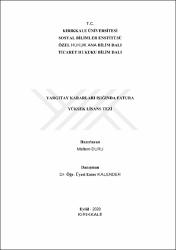| dc.contributor.advisor | Kalender, Emre | |
| dc.contributor.author | Duru, Meltem | |
| dc.date.accessioned | 2021-01-16T19:12:51Z | |
| dc.date.available | 2021-01-16T19:12:51Z | |
| dc.date.issued | 2020 | |
| dc.identifier.uri | | |
| dc.identifier.uri | https://hdl.handle.net/20.500.12587/17068 | |
| dc.description | YÖK Tez ID: 649454 | en_US |
| dc.description.abstract | Ticari faaliyetlerde kullanılan belgelerden biri faturadır. Yargıtay İBHGK'nin 27.06.2003 tarihli 2001/1 Esas 2003/1 Karar sayılı kararında fatura, "ticari satışlarda satıcı tarafından alıcıya verilen ve satılan malın miktarını, vasıflarını, ölçüsünü, fiyatını ve sair hususları veya ifa edilmiş hizmetleri gösteren hesap pusulası olup ticari belge niteliğinde olduğu" ifade edilerek tanımlanmıştır. Çok yönlü amaca hizmet eden yazılı ticari bir belge olan fatura, düzenleyen tacirin aleyhine delil niteliğine sahiptir. Karşı tarafın süresinde faturaya itiraz etmemesi sebebiyle fatura içeriği kabul edilmiş sayılacağından; fatura taraflar arasında yazılı delil niteliğine sahip olacaktır. Böylelikle, faturaya süresinde itiraz etmeyen taraf, faturanın aksini ancak başka yazılı delillerle ispat etmelidir. Faturaya süresi içerisinde karşı taraf itiraz ederse, faturayı düzenleyen tacir ispat yükü altında faturayı taraflar arasındaki ilişkiye uygun düzenlediğini ispat etmelidir. TTK'nin 21.maddesi fatura ile ilgili taraflar arasında çıkabilecek uyuşmazlıkların çözümü için ayrıntılı bir düzenleme ihtiva etmemektedir. Tez çalışmamızda fatura ile ilgili düzenlemeler incelenerek bu alanda uyuşmazlıkların nasıl sonuçlandırıldığı, ticari hayattaki gelişmelerin fatura alanındaki uyuşmazlıkları nasıl etkilediği hususları tezimin temel amacını oluşturmaktadır. Bu kapsamda, fatura ile ilgili kanuni düzenlemelerin, ticari örf ve âdetin uyuşmazlıklara uygulanmasında öneme sahip yargı kararları incelenmiştir. Faturanın kapsamında yapılan işin; miktarı, fiyatı, tutarı, türü, bedeli gibi hususların bulunması gereken asli unsurlardan olduğu, faturadaki vade farkı kaydı taraflarca kararlaştırılmamış ancak tacir tarafından faturada düzenlenmişse karşı tarafın faturaya süresinde itiraz etmemesi vade farkı kaydının geçerli olduğu anlamına gelmeyeceği sonuçlarına ulaşılmıştır. TTK'ye göre faturayı tebliğ alan kişinin kanunen tacir olması şart değildir. Yargıtay güncel kararlarında faturayı tebliğ alan kişi tacir değilse fatura tebliğ edildikten sonra 8 gün içinde faturaya itiraz edebileceği, etmediği takdirde TTK'nin 21/2.fıkrasında düzenlenen kanuni karinenin geçerli olacağını vurgulamıştır. Bu sebeple faturaya itiraz edilmediği takdirde tacir olmayan kişilerin fatura itirazına bağlanan kanuni karinenin hüküm ve sonuçlarından etkilenmeleri hakkaniyete uygun olmayacağından faturayı tebliğ alan kişinin tacir olması gerektiği sonucuna güncel Yargıtay içtihatları da dikkate alınarak tezin amacı doğrultusunda varılmıştır. Anahtar Kelimeler: Fatura, Faturanın Kapsamı, Faturaya İtiraz, İspat, Yazılı Delil, Vade Farkı | en_US |
| dc.description.abstract | One of the documents used in commercial activities is the invoice. In the decision of Supreme Court General Board of Case Law Unification (IBGK) dated 27.06.2003 and numbered 2001/1 Basis 2003/1, the invoice is defined as the accounting roll given to the buyer by the seller in commercial sales and showing the quantity, characteristics, size, price and other matters or services performed. Furthermore, it has been defined by stating that it is a commercial document. The invoice, which is a written commercial document serving a versatile purpose, has the nature of evidence against the issuing merchant. The invoice has the quality of documentary evidence between the parties as the content of the invoice is deemed to be accepted when the other party does not object to the invoice in due time. Thus, the party that does not object to the invoice in due time has to prove the opposite of the invoice only with other documentary evidence. If the other party objects to the invoice in due time, the merchant who issues the invoice must prove that the invoice is arranged in accordance with the relationship between the parties under the burden of proof. Article 21 of the Turkish Commercial Code (TCC) does not contain a detailed regulation for the resolution of disputes that may arise between the parties related to the invoice. The main purpose of my thesis is to examine the invoice regulations, how the disputes are resolved and how the developments in commercial life affect the disputes in the invoice area. In this context, the judicial decisions that are important in the application of legal regulations related to the invoice for the dispute of commercial customs were examined. It is concluded that the subjects such as the quantity, price, amount, type, price of the work done within the scope of the invoice are essential elements that must be found, and if the late fee record in the invoice is not decided by the parties, but it is arranged by the merchant in the invoice, the fact that the other party does not object to the invoice does not mean that the late fee record is valid. According to TCC, it is not legally required for the person receiving the invoice to be a merchant. In the current decisions of the Supreme Court, it is emphasized that if the person receiving the invoice is not a merchant, the person can object to the invoice within 8 days after the invoice is notified, if he does not object, the legal presumption in the paragraph 21/2 of the TCC will be valid. Therefore, it is concluded that the person receiving the invoice must be a merchant, taking into account the current Supreme Court case law, since it would not be fair for non-merchants to be affected by the provisions and consequences of the legal presumption, which is subject to the objection of the invoice. Key Words: Invoice, Scope of Invoice, Objection to Invoice, Proof, Documentary Evidence, Late Fee | en_US |
| dc.language.iso | tur | en_US |
| dc.publisher | Kırıkkale Üniversitesi | en_US |
| dc.rights | info:eu-repo/semantics/openAccess | en_US |
| dc.subject | Hukuk | en_US |
| dc.subject | Law | en_US |
| dc.title | Yargıtay kararları ışığında fatura | en_US |
| dc.title.alternative | Invoice in the light of Supreme Court decisions | en_US |
| dc.type | masterThesis | en_US |
| dc.contributor.department | KKÜ, Sosyal Bilimler Enstitüsü, , Özel Hukuk Anabilim Dalı | en_US |
| dc.identifier.startpage | 1 | en_US |
| dc.identifier.endpage | 175 | en_US |
| dc.relation.publicationcategory | Tez | en_US |
















